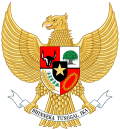This article may be a rough translation from Indonesian. It may have been generated, in whole or in part, by a computer or by a translator without dual proficiency.(September 2022) |
United Indonesia Coalition Koalisi Indonesia Bersatu | |
|---|---|
| Abbreviation | KIB |
| Founder | |
| Founded | 13 May 2022 |
| Dissolved | 13 August 2023 |
| Preceded by | |
| Succeeded by | |
| Political position | Centre-right to right-wing |
| Member parties | |
| Colours | Yellow |
| DPR RI | 148 / 575 |
| DPRD I | 566 / 2,232 |
| DPRD II | 4,668 / 17,340 |
| This article is part of a series on the |
| Politics of Indonesia |
|---|
 |
The United Indonesia Coalition (Indonesian : Koalisi Indonesia Bersatu) was an official political coalition in Indonesia that was formed through a political agreement between three political parties from the Onward Indonesia Coalition. These parties include Golkar, the National Mandate Party (PAN), and the United Development Party (PPP). The coalition was established in preparation for the 2024 Indonesian presidential election. [1]
On 12 May 2022, the leaders of the constituent parties held a meeting in Menteng, Central Jakarta. [2] The three leaders involved were Airlangga Hartarto from Golkar, Zulkifli Hasan from PAN, and Suharso Monoarfa from PPP. The word "United" carries a philosophical meaning within the coalition, representing Beringin , Surya , and Baitullah , which are the symbols associated with each of the political parties involved in the coalition. [3]